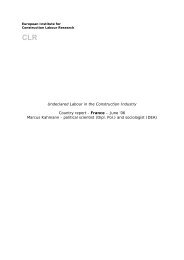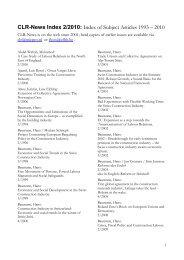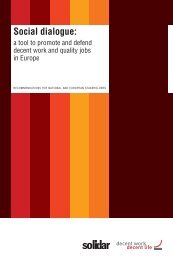Japan – what can we learn? - Construction Labour Research
Japan – what can we learn? - Construction Labour Research
Japan – what can we learn? - Construction Labour Research
You also want an ePaper? Increase the reach of your titles
YUMPU automatically turns print PDFs into web optimized ePapers that Google loves.
was the most precious asset they should share.The management practice thus formed, strengthened by the nature ofthe <strong>Japan</strong>ese capital market and government's industrial policies, castthe post-war enterprise into a model fairly different from thestockholder-oriented model in which the stockholders play the keyrole. This employment-oriented character of the enterprise has servedas the basis of stable industrial relations at the enterprise level. Thissystem of enterprise-based industrial relations eventually imparted tothe internal management market the ability of flexible response tovarious changes caused by technological innovation, transformation ofindustrial structures, and regional redistribution of management force.As long as employment enjoys stability, and fruits of growth aredistributed in a fair manner, the enterprise-based unionism is able toflexibly adapt to movement of workers within enterprises and changesin the nature of jobs caused by technological innovation (see Figure 1and 2).Now <strong>Japan</strong>ese enterprises are forced to change under the pressure ofthe rapid transformation of economic environment in the wake ofinternationalisation and innovation in information technology. Forsurvival in the sharpening international competition, <strong>Japan</strong>eseemployers have in the 1990s put into practice in rapid succession aseries of new policies centering on business restructuring for costreduction, managerial innovation, and organisational overhauling.They have also made employment "more flexible" for the sake ofpersonnel cost reduction. In the same vein, many employers nowpropose to revise the wage systems in favour of strengthened capacityand achievement evaluation in order to facilitate the selection of thefittest.In this situation, RENGO declares that for the sake of properpersonnel upbringing and stable employment "flexible employment"should not be used as an excuse for the neglect of long-termemployment stability, that in the evaluation of workers' capacity andachievement fair criteria should be established and that evaluationshould be done in such a way that it is acceptable to the workersthemselves as reasonable. Emphasizing the role of trade unions inprotecting jobs, RENGO proposes that the wage system be revisedfrom the point of view of making the concept of fair wage as seen bymanagement compatible with that of stable living wage. IndustrialCLR News No 2/200657









